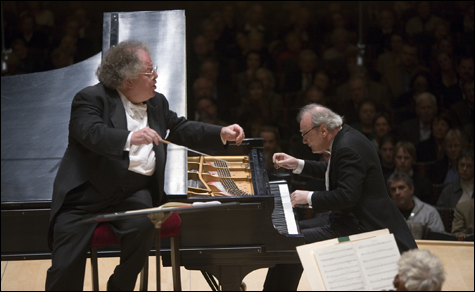James Levine and Christoph von Dohnányi at the BSO, Tod Machover at the ICA, Karita Mattila

MOZART’S CELESTIAL G-MAJOR CONCERTO: got a chamber-music lightness from the orchestra but rather non-committal playing by Alfred Brendel.
|
James Levine’s last program of the BSO season was an odd assortment. The first half was Mozart — the intense “little” G-minor Symphony and the celestial G-major Piano Concerto, K.453. At the press conference announcing the 2007–2008 schedule, the day after the first performance, he talked about the way the “huge rush of G minor” gets “released into the heaven of G major,” though he didn’t feel he had yet captured the right balance. The symphony was dramatic in an old-fashioned — but satisfying — way; the concerto got a chamber-music lightness from the orchestra but rather stiff, non-committal playing by veteran pianist Alfred Brendel.
The program was supposed to have included Gunther Schuller’s latest commission. The piece was done, but Levine felt it was too complex for the available rehearsal time, so he postponed it and substituted Schuller’s delightful Seven Studies on Themes of Paul Klee (1959), which hadn’t been played by the BSO here since 1964. It’s a cross between the Nutcracker Suite and Pictures at an Exhibition, incorporating a colorful variety of musical scenery and even some jazz. The concert ended with the Second Suite from Ravel’s ballet Daphnis et Chloé, which includes the famous dawn (i.e., sex) music and what’s probably the repertoire’s best-loved flute solo, here played with exquisite purity by Elizabeth Rowe. A coherent program? No. Enjoyable? Very. Levine’s opening-night program in the fall is all Ravel.
The season is ending with guest conductors. Christoph von Dohnányi returned for a program of works he’s performed here before, either with the BSO or with the Cleveland Orchestra. Especially seductive was the late György Ligeti’s mysterious Atmosphères, the spaciest music in 2001: A Space Odyssey. It starts with 28 violins each playing a different note — the universe seems to be swarming with gnats. Or DNA. Or violins. Seventy-three instruments in all, and almost none of them overlapping. Are we outside the cosmos looking in? Or are we surrounded — each self just another speck in the cosmic dust? It’s scary. Haunting. And beautiful. The muted music almost completely evaporates when suddenly a huge chord in the basses pulls us back down to earth. And then the dissolution begins again, but this time the dispersal is more final and we are left in inaudibility.
When suddenly, out of nowhere, the sound begins to well up again. Wait a minute — it’s not Ligeti; this diaphanous Sublime has a recognizable melody — it sounds like — it is — it’s Wagner! The Prelude to the first act of Lohengrin, emerging out of the momentary silence. Almost pure spirit. Almost unbearably beautiful. A living shimmer!
Dohnányi has done this before, but I can’t remember where or when. At his ill-fated BSO debut in 1989 (ill-fated because he left town after only one performance — sick, or sick of the BSO’s recalcitrance; the orchestra has since come round, and so has he), he played the same Ligeti on a program that also included Bartók’s Piano Concerto No. 2 with András Schiff. This time, the Bartók pianist was Pierre Laurent-Aimard, better known than Schiff for his performances of modern music. Schiff pounded away; Aimard was more refined, in a piece better known for its muscular juggernaut than for its delicate pizzicatos.
Dohnányi ended with Tchaikovsky’s Fourth Symphony, which he brought here with the Cleveland Orchestra in 2000. That performance was an object lesson to the BSO — full-throated but unforced brasses, shadowy syncopations, titillating pizzicatos. But now the BSO can equal the musicality and the brilliance of the Cleveland. The Tchaikovsky probably wasn’t as devastating as Tchaikovsky himself thought it should be — the finale sounded more like the cavalry arriving to the rescue than the trumpets of doom. But with especially characterful playing by oboe (John Ferrillo), bassoon (Richard Svoboda), and clarinet (William Hudgins), it was a wonderfully engaging showpiece.
I was eager to hear the Ying Quartet in an unusual “concept” program at the ICA conceived by an electronic-music master, MIT’s Tod Machover. At the heart of this event was Machover’s . . . but not simpler . . ., his new acoustic string quartet, which takes its title from Einstein’s famous remark “One should always make things as simple as possible, but not simpler.” Machover surrounded it with a selection of some of his favorite pieces, what he calls a “continuous fantasy,” an uninterrupted sequence that ranged from the opening and closing movements of Beethoven’s last string quartet (which bracket everything else) to two powerful Fragments for string quartet from the 1990s by one of Machover’s mentors, Elliott Carter, and a delicate movement from a Cage quartet to transcriptions of Bach, Byrd, and the Beatles (“A Day in the Life”), all joined by original “Interludes” composed by Machover.